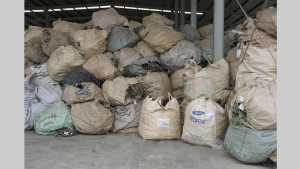Reassembling Rubbish and Worlding Electronic Waste
SFU Harbour Centre, 515 W. Hastings, Vancouver REASSEMBLING RUBBISH & WORLDING ELECTRONIC WASTE
A talk by e-waste geographer Josh Lepawsky
FRIDAY, OCTOBER 20, 4PM–6PM, ROOM 2270, SFU HARBOUR CENTRE
Event is free and open to the public
Co-presented by VIVO Media Arts Centre, SFU - School of Communication, Free Geek Vancouver, Institute for the Humanities at Simon Fraser University, and the Faculty of Communication, Art and Technology
Abstract:
"My talk addresses the global trade and traffic of discarded electronics or ‘e-waste’. It is premised on exploring a broad and deceptively simple question: What is the ‘right’ thing to do with electronic waste? This question raises intertwined, complex and urgent questions about sustainability, innovation, poverty, and prosperity that transcend the political and legal boundaries of any one nation. To date, the problem of electronic waste has predominantly been framed in media exposés, NGO reports, and much scholarly literature as being about waste generated by consumers in ‘developed’ countries being dumped on people and places in ‘developing’ countries. I argue that the latter framing of the e-waste problem actually hinders finding genuine solutions to it. While I provide a synopsis of the global flows of discarded electronics, I also detail the largely hidden, but far more vast, ‘upstream’ generation of waste from electronics in raw material extraction and manufacturing. I show that the prevailing policy prescriptions for solving the e-waste problem, such as trade bans and post-consumer recycling, have little hope of remedying the generation of e-waste. A myriad of solutions to e-waste—and other contemporary waste problems—exist if we defamiliarize ourselves from what might be called our ‘common sense’ notions of waste."
Josh Lepawsky is an Associate Professor in the Department of Geography at Memorial University of Newfoundland. Lepawsky researches the geographies of modern waste. Modern wastes are those that are synthetic, heterogeneous, and which entail high degrees of uncertainty around their mitigation or remediation. Two case studies inform his work: the international trade and traffic of discarded electronics (or ‘e-waste’) and, much more recently, ‘offworld rubbish’ which Lepawsky defines as the remains and discards of human extraterrestrial activity. More about his work can be found at his blog, Reassembling Rubbish: http://scalar.usc.edu/works/reassembling-rubbish/index.
This event will be taking place on the unceded traditional territories of the Coast Salish peoples of the xʷməθkwəy̓əm (Musqueam), Skwxwú7mesh (Squamish), and Səl̓ílwətaɬ (Tsleil-Waututh) Nations.
Places to go nearby approx. 15 minutes away





















